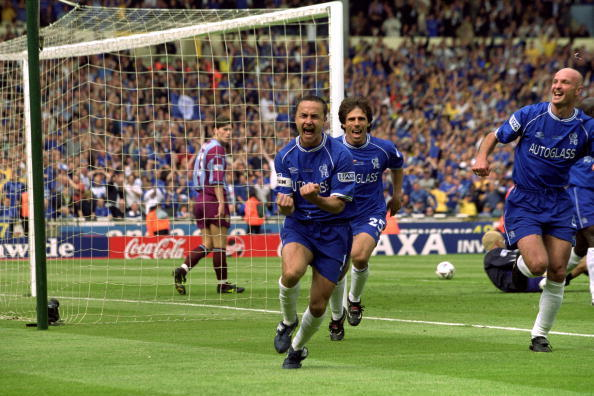Most English Premier League (EPL) fans born over the last two decades or so hardly think of Chelsea before owner Roman Abramovich’s time. The billionaire, who has owned the club for just as long, is as much if not more a part of the club’s storied history as the top-tier side’s long list of accolades and legendary players.
When did Abramovich buy Chelsea? Abramovich purchased Chelsea in 2003, a rumour surfaced that Abramovich was meant to buy Tottenham and flew to the wrong stadium. There is no doubt he made the right choice.
Abramovich has led Chelsea to its most success, within this period with Chelsea winning an impressive five Premier League and FA Cup titles alongside two UEFA Champions League and UEFA Europa League trophies.
However, for one to truly appreciate the Blues’ journey from obscurity to prominence, it is necessary to travel back in time and delve into the circumstances surrounding the club’s birth or rather rebirth, which was marked by Abramovich’s purchase of the club in June 2003 for a whooping £140 million.
Pre-Abramovich Era
Prior to Abramovich’s arrival, Chelsea had gone through its fair share of ups and downs having been founded over a century ago in 1905. After over four decades of trying to find their footing, the English side had its first major success in their 1954-55 season after winning their first ever First Division championship. The Pensioners would have mixed fortunes over the following decade before hitting a slump that was coupled with financial troubles in the late 70s and 80s.
The club’s luck however began to change after then owner Ken Bates acquired it for £1 in 1982. Under Bates’ leadership, Chelsea would experience a resurgence in the 90s, which was capped off by winning a League Cup and the UEFA Super Cup and Cup Winner’s Cup in 1998. This success largely came courtesy of their new crop of players like club legend Gianfranco Zola, whose on-pitch prowess elevated the West London-based club to new heights.
The 90s also sadly produced one of Chelsea’s all-time low moments after the club was accused of making illegal payments to its players in 1991. The matter was thereafter resolved with the Blues being slapped with a £105,000 fine.
Chelsea ushered in the new millennium by winning the FA Cup in 2000 but would quickly find themselves in an all too familiar situation which threatened to undo all the progress they had made since Bates took over.

The Arrival of Roman at Chelsea
In the hope of diversifying Chelsea’s income streams, Bates had undertaken a project dubbed Chelsea Village, which had in essence staked the club’s future on the development and eventual success of a high-end hotel and state-of-the-art shopping complex.
Though this calculated risk appeared to be a smart way of solving the club’s cash flow problems in the long run, it left the Blues’ coffers depleted in the short term and saddled them with debts of around £80 million, which if left unchecked would have caused Chelsea’s untimely demise.
Rather than let his dream for the club die prematurely, Bates sought out the help of the then little-known governor of Chukotka – a soft spoken and mostly reclusive Russian billionaire by the name of Roman Abramovich.
In Abramovich, Bates saw a kindred spirit, albeit from a different part of the world, with the necessary business acumen and deep pockets to propel the club to the “next level”. This unprecedented decision took many, including Chelsea fans, by surprise and ushered in a new era of “overseas sugar daddies” as Bates so eloquently put it, who looked to stake their claim on the fast-growing English Premier League.
Initial Reactions to Abramovich at Chelsea
Unknown to many, Abramovich wasn’t exactly welcomed with open arms. At least not initially. A Blues fan who was taken aback by the development even went as far as telling a major news outlet that Bates’ actions were “disgraceful” and that they had tarnished his reputation as “Mr. Chelsea”.
Perhaps Abramovich’s most vocal critic was then former sports minister Tony Banks, who publicly voiced his concerns over the Russian’s business dealings and whether the billionaire’s background made him a good fit and the “proper person” for the club. Banks further stated that according to him, a sale had been arranged to an individual they knew “nothing about.”
Some fans however welcomed the move because they felt that it provided the club with the necessary financial stability it needed to move forward, with one admitting that in its absence, he would have feared for Chelsea’s future especially with all the debts the club had.
Why Chelsea
It would surprise many to know that before Abramovich settled on acquiring Chelsea, the businessman had considered possibly acquiring one of two other clubs instead. Those clubs are none other than league rivals Tottenham and Manchester United.
Multiple reliable sources have even gone on record to state that Tottenham would have been the club that Abramovich bought had not owner Daniel Levy refused to sell the entrepreneur more than a 29.9% stake – a condition that saw a potential deal fall through since Abramovich hoped to acquire at least a majority stake and at best, full control.
Abramovich, like other Russian elite, had also recently acquired property in London from which he could oversee the day-to-day affairs of the club. In an interview after his purchase of the club was made official, Roman admitted that one of the reasons he had bought the club was because he was bored and he needed a new challenge.
The mogul was however careful to state that his purchase of Chelsea was “not about making money” as he had “many much less risky ways” of turning a profit than investing in the EPL side. He further sought to gain the confidence of Blues fans by adding that he didn’t want to throw away his money and that his decision was really about “having fun”, which meant “success and trophies”

Abramovich’s Only Regret
In a recent interview, Abramovich said that the only regret he had with buying Chelsea back in 2003 was the public profile owning the club brought him. He continued to state that had he known how much the move would have thrust him into the spotlight, he “would have thought differently about owning a club.”
Abramovich however confessed that he had developed a passion for the sport of football and particularly the EPL and that he had wanted to be a part of it “in one way or another.” Chelsea’s rich history and potential for success must have nevertheless outweighed any of these concerns and prompted the magnate to make one of the best decisions of his life as evidenced by the silverware the club has accumulated since then.
